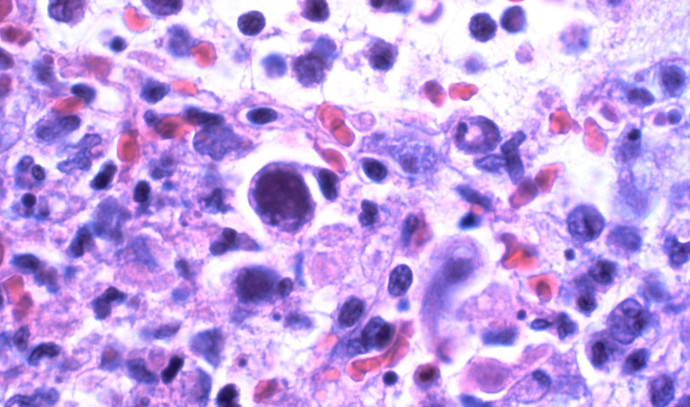The prevalence of congenital cytomegalovirus (cCMV) infection –a leading cause of childhood neurologic deficits with lifelong implications – in Israel is about 0.7%. Since 15% of the annual 145,000 pregnancies in Israel involve seronegative mothers who lack the virus in their blood, 21,750 to 29,000 women are at risk of developing primary CMV infection during pregnancy.
The condition is most often transmitted from the mother to the fetus via her placenta, but often there are no symptoms so it is left untreated.
CMV is the most common infectious cause of birth defects in the US, with about one in 200 infants born with cCMV, and 20% of newborns with it will have health difficulties, some of them lifelong, such as hearing loss and developmental problems. In the most severe cases, CMV can cause pregnancy loss. When it is identified in the newborn, is is treated with antiviral medications such as ganciclovir or valganciclovir, which could improve hearing and developmental outcomes.
A new study at the Hebrew University-Hadassah Medical Center has now shown that screening for cCMV can be carried out reliably with pooled saliva tests for universal screening. It was found to be an efficient, cost-saving, and sensitive method for identifying cCMV in newborns. The study emphasizes the significance of early detection through this method, especially for asymptomatic cases, highlighting its potential to revolutionize cCMV screening worldwide and improve the long-term outcomes for affected infants by enabling timely interventions.
In the study, Prof. Dana Wolf from Hadassah-Hebrew University Medical Center and the Lautenberg Center for General and Tumor Immunology, and HU’s Prof. Moran Yassour along with their teams and the Hadassah neonatology team headed by Prof. Smadar Eventov-Friedman, have successfully introduced pooled saliva polymerase chain reaction (PCR) tests for the universal screening of cCMV) infection.
This new method helps detect it and intervene early.
A crucial advancement in early detection
The research has just been published in the prestigious journal Nature Medicine under the title “Implementation of pooled saliva tests for universal screening of cCMV infection” and has aroused worldwide interest.
The burden of cCMV is large, and the lack of a universal screening method has posed challenges in promptly identifying and treating those infected. “Current screening methods focus on high-risk cases, but this misses many asymptomatic infants. Our new technique represents a significant stride in the field of universal newborn screening for cCMV, offering a promising avenue for early detection and intervention. The research team anticipates that this approach will pave the way for enhanced global efforts in combating its impact on newborns,” they wrote.
The study, conducted at the two Hadassah University Medical Centers in Jerusalem from April 2022 through April 2023, involved the screening of 15,805 infants, constituting an impressive 93.6% of all live newborns. Each sample is assigned to a single pool in one container, and the pools contain equal numbers of samples. All samples in negative result pools are declared negative, and those with a positive result then are then retested individually.
The implementation of pooled saliva tests emerged as a routine screening method during this 13-month period, showcasing its efficacy and reliability.
With a birth prevalence of 3.4 per 1,000 in the studied population, the successful implementation of pooled saliva tests, as shown by the study, signifies a crucial advancement in early detection. The challenge was to develop a reliable and efficient testing strategy due to the absence of a high-throughput screening test that can identify all infected neonates.
“Congenital cytomegalovirus is the most common intrauterine infection,” Wolf noted. “We were driven by the unmet clinical need to identify all infants with cCMV, including those who are asymptomatic at birth, so that early treatment and monitoring could be delivered to a large proportion of infants who are otherwise not diagnosed. This breakthrough has the potential to transform the lives of numerous infants annually, offering a more efficient and accessible means of identifying cCMV cases. The condition was identified in 54 newborns, half of them with no symptoms at birth who would have otherwise gone unnoticed.”
The project was facilitated by the newly available pooled diagnostic approach and the interdisciplinary collaborations that we established during the COVID-19 pandemic and that made universal screening of cCMV possible. “Our findings project on the wide feasibility and benefits of saliva sample pooling to enhance universal neonatal screening for cCMV. Data derived from the implemented universal screening will serve to define the true burden of cCMV and assess future vaccines,” Wolf explained.
The pooling setup can be easily adopted in medical laboratories, and parental acceptance was high. “The research emphasizes the clinical importance of universal screening for early diagnosis, monitoring, and potential treatment and suggests that universal screening is crucial to uncover undiagnosed cases,” the team concluded.
Yassour, who received her doctorate in computer science and computational biology from HU, said she “wanted to study something I could easily explain to my grandmother… Something clear.”




